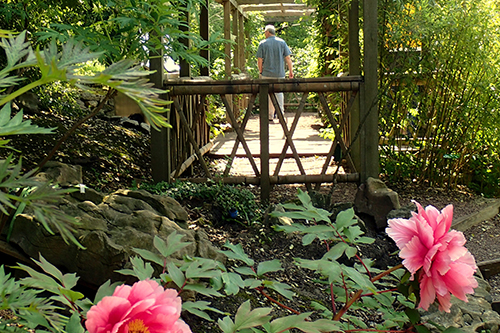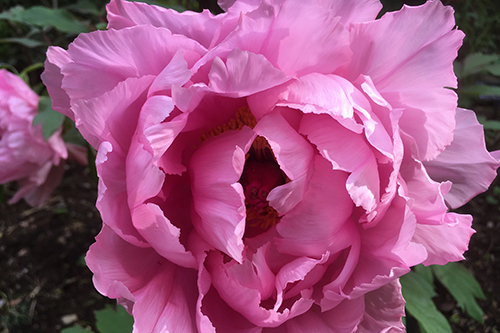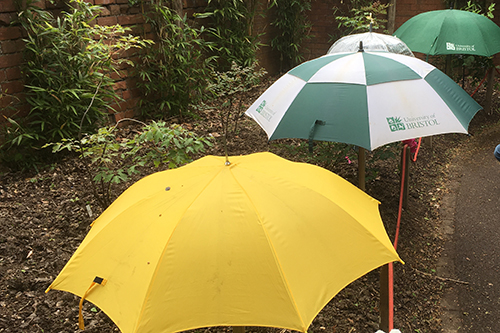In ancient China, peonies were the Emperor's Flower and were only grown for the Emperor and in his gardens. Anyone found growing peonies at their private residents illegally were executed. Now the peony is the people's flower and is found everywhere from bank notes and coins, to advertising everyday products. They hold a special place in Chinese hearts and are revered in Chinese culture.
Peonies have long been admired for their voluptuous beauty, medicinal uses and their symbolism. Among the tree peonies, the male vermilion flower is known as the 'King of Flowers' and represents both royalty and aristocracy. The herbaceous peonies are termed the 'Prime Minister of All Flowers' and are also highly prized. They have long been depicted in literary and visual Chinese art forms for centuries and form one of the main motifs in silk tapestries, painting, lacquerware and clothing.
The new peony garden at the Botanic Garden has been developed to show the main species sections of Chinese peonies and focuses on their development through hybridisation in China, Japan and America.
Nick Wray, Curator of the Botanic Garden, said: "Gardeners resorted to using umbrellas to keep rare peony flowers protected from inclement weather. These delicate and unusual flowers are damaged by rain, cold, wind. We have nurtured and nudged these plants into flower and now we need to protect them ahead of Sunday’s peony day. Never have peonies had such attention, but these flowers are unique in the West Country and that makes them special."
The garden includes cultivars of both Paeonia x suffructicosa (mu dan) and Paeonia lactiflora (bai shao) and the collection illustrates the major cultivar regions of China / Japanese grafted cultivars and the Itoh hybrid tree peonies. The garden is also very fortunate to have a rare group of named Gansu mu dan cultivars from the collection of the leading UK expert Will McLewin.
One of the new peonies is part of the intersectional Itoh Hybrid range; a group of peonies that was first developed in Japan by Dr Toichi Itoh who managed to transfer pollen from a Chinese tree peony onto the stigma of a herbaceous peony. Although both are in the same genus they are genetically far apart; the process took thousands of attempts to get successful pollination and seed development. Finally, Dr Itoh achieved his aim and raised a few seedlings, but sadly died before they were mature enough to flower.
After his death the hybrids were taken to America and developed by peony breeders there. The garden's plant is Paeonia 'Sequestered Sunshine', deep yellow with orange at the base of each petal. The Itoh Hybrid range is famous for these yellow blooms, which are very unusual and was the subject of Dr Itoh's work for many years.
The new garden, although small, makes up for this in terms of collaboration and knowledge and celebrates the fruitful partnership between the University, The Register of Chinese Herbal Medicine and the Bristol China Bureau as founders of the Chinese Culture garden.
Nick Wray added: "We are excited that we have obtained some of these exceptionally special plants that flower for such a fleeting time. Their history in Chinese culture is so important and they are rarely cultivated in Britain. The Peony Day has been created for everyone to enjoy and learn a little more about these beautiful flowers and their rich history.
"The peonies are already well ahead in terms of flowering, and I hope they will still be in flower on the study day."
Throughout the day there will a programme of talks covering different aspects of peonies. In the morning, in the Linnaeus Study Room. Lady Christine Skelmersdale, founder and owner of Broadleigh Gardens will discuss the many peony species she grows. She has travelled in Central Asia and the Himalayas searching out wild peonies. Tony Harrison, Chinese Medicinal Herb Garden Co-ordinator and herbalist will outline the use of different peony species in traditional Chinese medicine and Will McLewin, the leading UK peony expert, will talk about the Gansu mu dan cultivars.
In the afternoon, Nick Wray will give a tour on the construction of the peony garden and culture garden before the opening ceremony performed by Rosa Hui MBE DL Director of the Bristol & Avon Chinese Women’s Group and founding member of the Bristol China Bureau.
Tony Harrison will also lead a tour of the new garden and there will be opportunities for visitors to join a general tour of the Botanic Garden with volunteer guides. During the day there will be a plant sale from Kelways, which is the leading UK peony cultivation nursery.
The Peony Study Day, at the University of Bristol Botanic Garden at The Holmes, Stoke Park Road, Bristol, BS9 1JG, will take place on Sunday 12 May from 10 am to 5 pm.
The event is open to all and no prior booking is needed. Entry will be £6.00 (£6.60 with Gift Aid) Free entry for Friends, children, ALL students and university staff.


